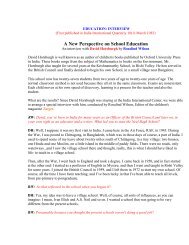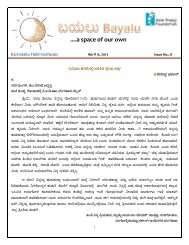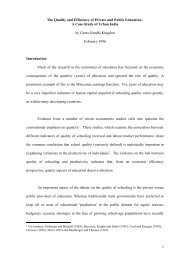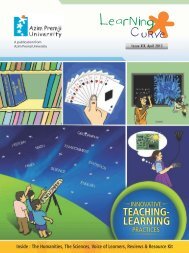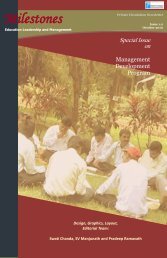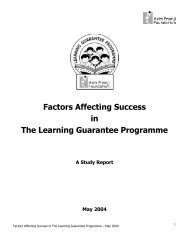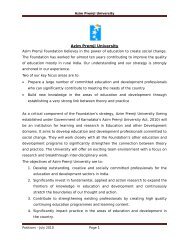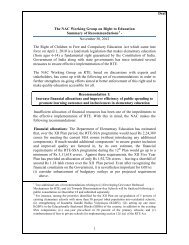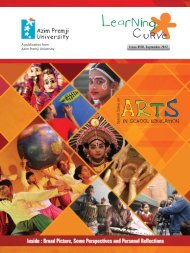Indesign Pagesnew.indd - Azim Premji Foundation
Indesign Pagesnew.indd - Azim Premji Foundation
Indesign Pagesnew.indd - Azim Premji Foundation
You also want an ePaper? Increase the reach of your titles
YUMPU automatically turns print PDFs into web optimized ePapers that Google loves.
10<br />
Section B<br />
Facing history and Ourselves: Studying<br />
History is a Moral Enterprise<br />
Martin Sleeper and Adam Strom<br />
Refl ecting on the purposes of history education Raquel<br />
F., a high school student from Brazil who took a<br />
Facing History and Ourselves course at International<br />
High School in Queens, New York, explained:<br />
“Sometimes school in Brazil was like sitting in a classroom<br />
with steamed up windows. Light came in but you cannot<br />
see out. History, when taught well, can make that glass<br />
transparent. You can see and make clear the relationship<br />
between what we learn in school and our own lives.”<br />
“I know that we don’t learn history to place blame. The<br />
members of my stepmother’s family are all German. Am<br />
I to blame her for what happened during the Holocaust?<br />
How many generations of people can we hold responsible<br />
for the past? I’m responsible for what I do, not for what my<br />
ancestors have done.”<br />
“Now let’s think about what history we learn. It is important<br />
that we learn the uncomfortable parts. It is from the<br />
uncomfortable parts that we really learn. It’s there that we<br />
can fi nd the confl icts that help us to understand ourselves.”<br />
Raquel’s voice reminds us of a fundamental truth about<br />
young people: they have both the capacity and the tendency<br />
to connect historical issues to their own lives. That is how<br />
they make sense of the past. In addition to the cognitive<br />
components noted below, history education must help<br />
students to develop their burgeoning moral philosophy –<br />
their unique voices - in complex, academically rigorous and<br />
personal ways. By connecting history to themselves, students<br />
can build an intellectual and ethical vocabulary to apply to<br />
their study history and to think about its meaning for the<br />
decisions encompassed in their own civic environments.<br />
History comes to life when students make connections with<br />
their own worlds that help them to relate to its protagonists<br />
and make sense of their motivations, decisions, and actions.<br />
At the same time, students gain new perspective on what is<br />
happening today – in their personal lives and in the larger<br />
world. This dynamic of moving back and forth between a<br />
study of history and a study of today holds special urgency<br />
for adolescents, who are beginning to see and defi ne<br />
themselves as part of a larger history and often are seeking<br />
ways to “make a difference.” It has been an integral part<br />
of the Facing History and Ourselves pedagogy since the<br />
organization’s founding 1 .<br />
That said, studying history in relation to present-day social<br />
and civic issues presents continuing intellectual challenges:<br />
understanding events within their own historical context,<br />
avoiding simple parallels between events that share a<br />
superfi cial similarity, and coming to understand how events<br />
in the past have (or have not) infl uenced the present. It<br />
involves bringing historical concepts and methods of inquiry<br />
to bear on understanding a particular history and assessing<br />
its universal implications. It also means seeing oneself as<br />
shaped by history and as a player in its ongoing creation.<br />
In order to help students “face history,” it is essential to<br />
consider how they are likely to understand the material,<br />
given their personal and educational backgrounds and levels<br />
of cognitive development; it is important to craft lessons and<br />
assignments that address their articulated questions and<br />
unarticulated concerns, thus helping them build a deeper<br />
understanding of history and of themselves. At the same<br />
time, as teachers, we need to be careful not to assume that<br />
we know how students will respond to a particular piece of<br />
content or the questions they will raise. That means, creating<br />
a space for students refl ect on the content in writing, and in<br />
class discussion.<br />
In fact, any meaningful study of history<br />
requires an intellectually honest look at past<br />
events and at their implications for how<br />
we understand ourselves as human beings<br />
and how, individually and collectively, we<br />
choose to live our lives.<br />
Pg No: 52



